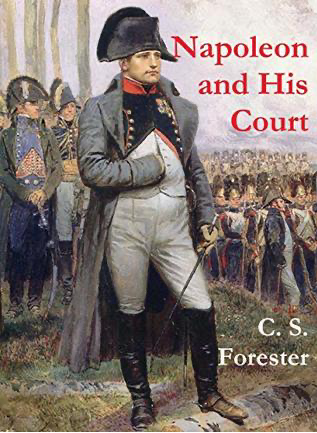
From the man that brought us Hornblower comes this fascinating pseudo-biography of Napoleon. I happened to stumble upon this 1924 C.S. Forester work as an Amazon Deal of the Day, and I will say I am happy to have read it.
Napoleon and his Court seeks to see the man by exploring those around him. It is superbly written although being one of Forester’s earliest works – at a time when he was apparently known for his hack biographies. Although it is blatantly and consistently opinionated (and in tone deprecating), Forester’s appreciation of the breadth of Napoleon’s life and achievements is both obvious and demonstrated. There is a clear and overwhelming plan to raze the mythology of ‘Napoleon the Great’ casting him as not only ‘not so great’, but as a brilliant misanthrope. This from an author that tells a superb tale and delivers an engaging and engrossing read.
The trajectory of the work explores those around Napoleon. It progresses from his marshals to senior officers, to brothers, sisters, his mother, and the women in his life. His marshals who are dismissed mainly as greedy and corrupt raised to be either dependent on Napoleon for strategic direction or grasping to supplant him. Joseph is inept and moody, Louis is vain and imbalanced, Lucien is jealous and arrogant, leaving Jerome, young, erratic but demonstrating some Bonaparte drive. Josephine missed her chance but provided grace to the court. Marie Louise is infantile as a result of her upbringing and Marie Waleska, possibly a genuine love of his life. The author contends that Napoleon had little respect for women and grew misogynist after Josephine’s early adulterous snubbing of his naive ardor.
An interpretive reading of this book suggests that Forester saw Napoleon as a military genius who largely failed when he didn’t follow his own dictums or was let down by subordinates. But, you won’t hear that directly from the author. Much of the success he directly attributes to underlings or to Napoleon himself he cites circumstance rather than strategy or the ineffectiveness of his opponents.
The chapter on ‘what if’s’ attempts to address all the popularly discussed mistakes made. Forester questions whether options did exist. He often concludes that there were minimal options, and Napoleon made the best of a bad lot. Nonetheless, the author implies between the lines; Napoleon lived an extraordinary life from lifelong challenges. He further cites his tremendous generosity as a man, but stinginess as an emperor. Forester concluded with the summation that Napoleon lived and died alone, a man without a friend.
The cleverness of this work is how it seeks to find Napoleon by examining the impacts of and on the people around him. It is odd in its totality because the tone is so scathing. The author seeks to exude disdain for the individual that he has chosen (or been told to) chronicle. Yet, the subtext hints at logical respect, admiration, and acknowledgment that Napoleon was indeed someone set apart and great. But the author holds to this grudgingly. He assumes a lot on the part of the reader to know their Napoleonic history. That being said, there is nothing wrong with this approach. Having an appropriate counterpoint to the blatant hero-worship and hagiographical mythology of so many applies a necessary balance – and is never a bad thing.
